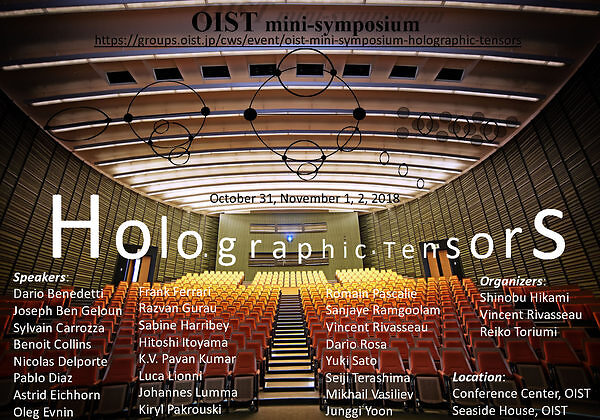OIST Mini Symposium "Holographic Tensors"

Date
Location
Description
The aim of this mini-symposium is to provide an opportunity for discussion of recent discovered tensor field theory. It has been known that matrix model can describe interesting physical phenomena including gravity, gauge fields, but it is difficult to solve. Recent development of newly proposed tensor model can provide explicit solutions for interesting phenomena including black hole and gravity and so called SYK model. In this symposium, we gather researchers of related fields, and make intense discussions.
Very recently (in November 2016), it was noticed by Witten in his paper (arXiv:1610.09758), that the Sachdev-Ye-Kitaev (SYK) model and tensor models share the same large N limit. The SYK model has been intensely studied since its invention by Kitaev in 2015. Indeed it is the only known model which is at the same time solvable and maximally chaotic, two features previously thought mutually exclusive. It provides a much-sought example for approximate conformal invariance and (near) AdS2/CFT1 duality. Since black holes in AdS space of any dimension have an asymptotic two dimensional effective "throat" ear their horizon, the SYK model is particularly fascinating, as it provides the first example of a model to study non-extremal black holes at finite temperature, hopefully providing clues to solve the famous information paradox related to Hawking radiation.
However the SYK model is a quenched model, i.e. it is a Gaussian average of models, therefore not completely quantum mechanical. As recalled by Witten, tensor models are genuinely quantum. They also have a richer symmetry, therefore they are potentially of greater interest for quantum gravity. Tensor models were ineed previously studied by the Paris school (Gurau, Rivasseau, Ben Geloun, Bonzom...) mainly as candidates for quantum gravity, since their perturbative expansion performs a quantum sum over discretized spacetimes pondered by the Einstein-Hilbert action. The large N limit correspondence between the SYK model and tensor models has opened up a new window for using tensor models directly to study physical objects such as black holes.
Therefore the new class holographic tensor models such as the Gurau-Witten or Carrozza-Tanasa-Klebanov-Tarno polsky models has been actively studied since November 2016, gathering increasingly more interest in both communities, the AdS/CFT and SYK community on one side, and the tensor model community on the other. However these two communities still work in parallel and largely independently so far, although their interaction could be extremely fruitful.
The idea of this mini-symposium is therefore to bring together in this timely manner the leading experts on both sides, in order to accelerate progress. There has never been yet a workshop dedicated to this interaction around the notion of holographic tensors.The format of an OIST mini-symposium is perfect for this purpose as it will create intensely focused discussions. With this mini-symposium, we expect to rapidly create outstanding international research collaborations which would not happen otherwise.
Invited Speakers
- Dario Benedetti, LPT Orsay, Univ. Paris-Sud 11
- Joseph Ben Geloun, Laboratoire d'Informatique de Paris Nord
- Sylvain Carrozza, Perimeter Institute for Theoretical Physics
- Benoit Collins, Kyoto University
- Nicolas Delporte, LPT Orsay, Univ. Paris-Sud 11
- Pablo Diaz, CTPU, Institute for Basic Science
- Oleg Evnin, Chulalongkorn University (Bangkok) and Solvay Institutes (Brussels)
- Astrid Eichhorn, University Heidelberg
- Frank Ferrari, Université Libre de Bruxelles (to be confirmed)
- Razvan Gurau, Centre de Physique Theorique, Ecole Polytechnique
- Sabine Harribey, CPHT Ecole Polytechnique
- Hiroshi Itoyama, Osaka City University
- K.V. Pavan Kumar, Indian Institute of Science
- Luca Lionni, YITP, Kyoto University
- Johannes Lumma, Heidelberg University
- Romain Pascalie, University of Bordeaux
- Sanjaye Ramgoolam, Queen Mary University
- Vincent Rivasseau, LPT Orsay, Univ. Paris-Sud 11
- Dario Rosa, Korea Institute for Advanced Study
- Yuki Sato, Nagoya University
- Seiji Terashima, YITP, Kyoto University
- Mikhail Vasilyev, Lebedev Physical Institute
- Yoon Junggi, KIAS
OIST organizers:
- Reiko Toriumi, Gravity, Quantum Geometry and Field Theory Unit
- Shinobu Hikami, Mathematical and Theoretical Physics Unit
Co-organizer:
- Vincent Rivasseau, Laboratoire de Physique Théorique d'Orsay, Université Paris-Sud 11
Talk Recordings: https://groups.oist.jp/holographictensors/videos
Attachments
Subscribe to the OIST Calendar: Right-click to download, then open in your calendar application.



